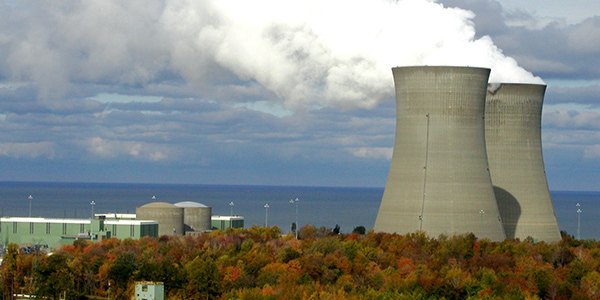Ohio lawmakers this week voted unanimously to eliminate the $1.1 billion customer-paid subsidy they created in July 2019 to bail out the state’s two nuclear power plants then owned by a former FirstEnergy subsidiary that had filed for bankruptcy protection.
A spokesman for Energy Harbor, the company that emerged from the bankruptcy of FirstEnergy Solutions, did not return a phone message or an email seeking comment.
Gov. Mike DeWine (R) is expected to sign the legislation, House Bill 128, when it arrives on his desk, ending at least one legislative chapter in what federal prosecutors have called “likely the largest bribery, money-laundering scheme ever perpetrated against the people in the state of Ohio.”
Those prosecutors have alleged that former Ohio House Speaker Larry Householder (R) forced the passage of H.B. 6, creating the nuclear subsidy as well as subsidies for two 1950s coal plants operated by the Ohio Valley Electric Corp. (OVEC). It also created a $20 million temporary fund for a half dozen utility-scale solar farms previously approved but not yet built.
The federal investigation involved FirstEnergy as well as Energy Harbor. FirstEnergy fired its CEO and four others following its own internal investigation. The company recently hired a new chief ethics officer. (See FirstEnergy Names Chief Ethics and Compliance Officer.)
Former U.S. Attorney for the Southern District of Ohio David DeVillers recently said a grand jury has resumed its investigation into Householder, already indicted along with four associates on racketeering charges, after shutting down in November because of the COVID-19 pandemic.
H.B. 128 eliminates only the nuclear subsidies. It does nothing to remove the OVEC subsidies, which have been estimated to be worth more than $700 million. And while the legislation keeps the temporary subsidy for the solar projects, it does not affect the state’s renewable portfolio standard, which the GOP leadership previously capped at 8.5% by 2026.
Nor does H.B. 128 restore customer-paid utility consumer energy efficiency programs.
“I don’t see those coming back, House Speaker Bob Cupp (R) said in a brief teleconference following passage of the bill late Thursday.
Cupp did say, however, that he expects Rep. Jim Hoops (R) to hold hearings on the issue of the OVEC subsidy.
In a statement issued a short time later, Cupp said the bill is one “that Ohioans can be proud of — one that retains carbon-free energy in the state, provides additional ratepayer protections and savings, and moves Ohio forward. This is sound energy policy.”
Although there was no debate on the House floor before passage of the bill, Rep. Kent Smith (D) urged passage but noted that the bill did not remove the OVEC subsidies. “I would hope that this chamber would bring that up in the remaining 21 months” of the legislative session, he said.
Rep. Dick Stein (R), a co-sponsor of the original version of H.B. 128, which would have also removed the subsidies for the solar projects, also recommended passage.




